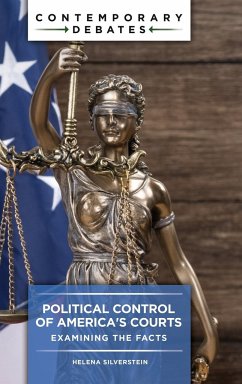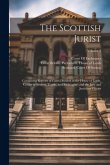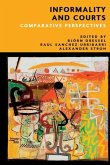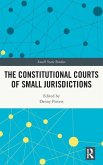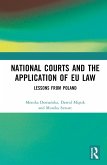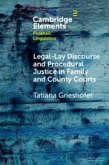- Gebundenes Buch
- Merkliste
- Auf die Merkliste
- Bewerten Bewerten
- Teilen
- Produkt teilen
- Produkterinnerung
- Produkterinnerung
This work is intended to help readers understand the many ways in which politics shapes the allegedly nonpartisan judicial system in America.
Andere Kunden interessierten sich auch für
![Courts that Matter Courts that Matter]() Sandra Botero (Colombia Universidad del Rosario)Courts that Matter126,99 €
Sandra Botero (Colombia Universidad del Rosario)Courts that Matter126,99 €![The Scottish Jurist: Containing Reports of Cases Decided in the House of Lords, Courts of Session, Teinds, and Exchequer, and the Jury and The Scottish Jurist: Containing Reports of Cases Decided in the House of Lords, Courts of Session, Teinds, and Exchequer, and the Jury and]() The Scottish Jurist: Containing Reports of Cases Decided in the House of Lords, Courts of Session, Teinds, and Exchequer, and the Jury and33,99 €
The Scottish Jurist: Containing Reports of Cases Decided in the House of Lords, Courts of Session, Teinds, and Exchequer, and the Jury and33,99 €![Informality and Courts Informality and Courts]() Informality and Courts154,99 €
Informality and Courts154,99 €![The Constitutional Courts of Small Jurisdictions The Constitutional Courts of Small Jurisdictions]() The Constitutional Courts of Small Jurisdictions152,99 €
The Constitutional Courts of Small Jurisdictions152,99 €![Essential Magistrates' Courts Law Essential Magistrates' Courts Law]() Howard RiddleEssential Magistrates' Courts Law32,99 €
Howard RiddleEssential Magistrates' Courts Law32,99 €![National Courts and the Application of EU Law National Courts and the Application of EU Law]() Monika DomanskaNational Courts and the Application of EU Law142,99 €
Monika DomanskaNational Courts and the Application of EU Law142,99 €![Legal-Lay Discourse and Procedural Justice in Family and County Courts Legal-Lay Discourse and Procedural Justice in Family and County Courts]() Tatiana Grieshofer (Birmingham City University)Legal-Lay Discourse and Procedural Justice in Family and County Courts24,99 €
Tatiana Grieshofer (Birmingham City University)Legal-Lay Discourse and Procedural Justice in Family and County Courts24,99 €-
-
-
This work is intended to help readers understand the many ways in which politics shapes the allegedly nonpartisan judicial system in America.
Hinweis: Dieser Artikel kann nur an eine deutsche Lieferadresse ausgeliefert werden.
Hinweis: Dieser Artikel kann nur an eine deutsche Lieferadresse ausgeliefert werden.
Produktdetails
- Produktdetails
- Contemporary Debates
- Verlag: Bloomsbury Publishing Plc
- Seitenzahl: 226
- Erscheinungstermin: 31. Januar 2023
- Englisch
- Abmessung: 240mm x 161mm x 17mm
- Gewicht: 502g
- ISBN-13: 9781440878053
- ISBN-10: 1440878056
- Artikelnr.: 67385039
- Herstellerkennzeichnung
- Libri GmbH
- Europaallee 1
- 36244 Bad Hersfeld
- gpsr@libri.de
- Contemporary Debates
- Verlag: Bloomsbury Publishing Plc
- Seitenzahl: 226
- Erscheinungstermin: 31. Januar 2023
- Englisch
- Abmessung: 240mm x 161mm x 17mm
- Gewicht: 502g
- ISBN-13: 9781440878053
- ISBN-10: 1440878056
- Artikelnr.: 67385039
- Herstellerkennzeichnung
- Libri GmbH
- Europaallee 1
- 36244 Bad Hersfeld
- gpsr@libri.de
Helena Silverstein js Professor and Department Head of Government and Law at Lafayette College, USA.
Acknowledgments
How to Use This Book
1. Nominations, Confirmations, and Departures of Federal Judges
Q1. Are nominations and confirmations to the federal bench based on factors
beyond merit?
Q2. Do outside organizations influence whom the president nominates to the
federal bench?
Q3. Do interest groups influence the Supreme Court confirmation process?
Q4. Is it unusual for the Senate to reject a Supreme Court nominee?
Q5. Was the Senate's refusal to take action on President Obama's Supreme
Court nomination of Merrick Garland really unprecedented?
Q6. Are Supreme Court confirmation hearings a "vapid and hollow charade"?
Q7. Is the timing of judicial retirements from the Supreme Court influenced
by politics?
Q8. Did President Trump's judicial appointments fundamentally re-make the
federal judiciary for decades to come?
2. Judicial Elections to State Courts
Q9. Have contested judicial elections become more political over recent
decades?
Q10. Are nonpartisan judicial elections less political than partisan
judicial elections?
Q11. Has politicization of judicial retention elections increased?
Q12. Does the growth of campaign spending by interest groups affect
judicial independence?
Q13. Do politicized judicial elections threaten the legitimacy of state
courts?
3. Structures Affecting the Courts
Q14. Has Congress or the president ever sought to adjust the size of the
Supreme Court for political gain?
Q15. Can Congress strip the Supreme Court and lower federal courts of their
jurisdiction?
Q16. Would term limits make the Supreme Court less politicized?
Q17. Was the end of the filibuster in federal judicial confirmations a
historic rule change?
Q18. Is the end of the filibuster in federal judicial confirmations likely
to increase polarization on
the federal courts?
4. Decisions and Decision Making
Q19. Are Supreme Court justices influenced by public opinion?
Q20. Do judges' political attitudes and ideologies influence their legal
decisions?
Q21. Did the Supreme Court's "switch in time that saved nine" occur in
direct response to external political pressure?
Q22. Is the influence of amicus briefs on the Supreme Court growing?
Q23. Is the Supreme Court using the "shadow docket" more frequently?
5. Public Perceptions of the Judiciary
Q24. Is public faith and confidence in the Supreme Court in decline?
Q25. Does the public believe the courts are political and partisan?
Q26. Does the public's perception of the judiciary vary by party
affiliation?
Q27. Has the judicial philosophy known as "originalism" become dominant in
American jurisprudence and accepted by the public?
6. Politicization, Partisanship, and Legitimacy
Q28. Were President Trump's criticisms of the judiciary unusual?
Q29. Has the Supreme Court become more partisan?
Q30. Is the Supreme Court facing a legitimacy crisis?
Subject Index
About the Author
How to Use This Book
1. Nominations, Confirmations, and Departures of Federal Judges
Q1. Are nominations and confirmations to the federal bench based on factors
beyond merit?
Q2. Do outside organizations influence whom the president nominates to the
federal bench?
Q3. Do interest groups influence the Supreme Court confirmation process?
Q4. Is it unusual for the Senate to reject a Supreme Court nominee?
Q5. Was the Senate's refusal to take action on President Obama's Supreme
Court nomination of Merrick Garland really unprecedented?
Q6. Are Supreme Court confirmation hearings a "vapid and hollow charade"?
Q7. Is the timing of judicial retirements from the Supreme Court influenced
by politics?
Q8. Did President Trump's judicial appointments fundamentally re-make the
federal judiciary for decades to come?
2. Judicial Elections to State Courts
Q9. Have contested judicial elections become more political over recent
decades?
Q10. Are nonpartisan judicial elections less political than partisan
judicial elections?
Q11. Has politicization of judicial retention elections increased?
Q12. Does the growth of campaign spending by interest groups affect
judicial independence?
Q13. Do politicized judicial elections threaten the legitimacy of state
courts?
3. Structures Affecting the Courts
Q14. Has Congress or the president ever sought to adjust the size of the
Supreme Court for political gain?
Q15. Can Congress strip the Supreme Court and lower federal courts of their
jurisdiction?
Q16. Would term limits make the Supreme Court less politicized?
Q17. Was the end of the filibuster in federal judicial confirmations a
historic rule change?
Q18. Is the end of the filibuster in federal judicial confirmations likely
to increase polarization on
the federal courts?
4. Decisions and Decision Making
Q19. Are Supreme Court justices influenced by public opinion?
Q20. Do judges' political attitudes and ideologies influence their legal
decisions?
Q21. Did the Supreme Court's "switch in time that saved nine" occur in
direct response to external political pressure?
Q22. Is the influence of amicus briefs on the Supreme Court growing?
Q23. Is the Supreme Court using the "shadow docket" more frequently?
5. Public Perceptions of the Judiciary
Q24. Is public faith and confidence in the Supreme Court in decline?
Q25. Does the public believe the courts are political and partisan?
Q26. Does the public's perception of the judiciary vary by party
affiliation?
Q27. Has the judicial philosophy known as "originalism" become dominant in
American jurisprudence and accepted by the public?
6. Politicization, Partisanship, and Legitimacy
Q28. Were President Trump's criticisms of the judiciary unusual?
Q29. Has the Supreme Court become more partisan?
Q30. Is the Supreme Court facing a legitimacy crisis?
Subject Index
About the Author
Acknowledgments
How to Use This Book
1. Nominations, Confirmations, and Departures of Federal Judges
Q1. Are nominations and confirmations to the federal bench based on factors
beyond merit?
Q2. Do outside organizations influence whom the president nominates to the
federal bench?
Q3. Do interest groups influence the Supreme Court confirmation process?
Q4. Is it unusual for the Senate to reject a Supreme Court nominee?
Q5. Was the Senate's refusal to take action on President Obama's Supreme
Court nomination of Merrick Garland really unprecedented?
Q6. Are Supreme Court confirmation hearings a "vapid and hollow charade"?
Q7. Is the timing of judicial retirements from the Supreme Court influenced
by politics?
Q8. Did President Trump's judicial appointments fundamentally re-make the
federal judiciary for decades to come?
2. Judicial Elections to State Courts
Q9. Have contested judicial elections become more political over recent
decades?
Q10. Are nonpartisan judicial elections less political than partisan
judicial elections?
Q11. Has politicization of judicial retention elections increased?
Q12. Does the growth of campaign spending by interest groups affect
judicial independence?
Q13. Do politicized judicial elections threaten the legitimacy of state
courts?
3. Structures Affecting the Courts
Q14. Has Congress or the president ever sought to adjust the size of the
Supreme Court for political gain?
Q15. Can Congress strip the Supreme Court and lower federal courts of their
jurisdiction?
Q16. Would term limits make the Supreme Court less politicized?
Q17. Was the end of the filibuster in federal judicial confirmations a
historic rule change?
Q18. Is the end of the filibuster in federal judicial confirmations likely
to increase polarization on
the federal courts?
4. Decisions and Decision Making
Q19. Are Supreme Court justices influenced by public opinion?
Q20. Do judges' political attitudes and ideologies influence their legal
decisions?
Q21. Did the Supreme Court's "switch in time that saved nine" occur in
direct response to external political pressure?
Q22. Is the influence of amicus briefs on the Supreme Court growing?
Q23. Is the Supreme Court using the "shadow docket" more frequently?
5. Public Perceptions of the Judiciary
Q24. Is public faith and confidence in the Supreme Court in decline?
Q25. Does the public believe the courts are political and partisan?
Q26. Does the public's perception of the judiciary vary by party
affiliation?
Q27. Has the judicial philosophy known as "originalism" become dominant in
American jurisprudence and accepted by the public?
6. Politicization, Partisanship, and Legitimacy
Q28. Were President Trump's criticisms of the judiciary unusual?
Q29. Has the Supreme Court become more partisan?
Q30. Is the Supreme Court facing a legitimacy crisis?
Subject Index
About the Author
How to Use This Book
1. Nominations, Confirmations, and Departures of Federal Judges
Q1. Are nominations and confirmations to the federal bench based on factors
beyond merit?
Q2. Do outside organizations influence whom the president nominates to the
federal bench?
Q3. Do interest groups influence the Supreme Court confirmation process?
Q4. Is it unusual for the Senate to reject a Supreme Court nominee?
Q5. Was the Senate's refusal to take action on President Obama's Supreme
Court nomination of Merrick Garland really unprecedented?
Q6. Are Supreme Court confirmation hearings a "vapid and hollow charade"?
Q7. Is the timing of judicial retirements from the Supreme Court influenced
by politics?
Q8. Did President Trump's judicial appointments fundamentally re-make the
federal judiciary for decades to come?
2. Judicial Elections to State Courts
Q9. Have contested judicial elections become more political over recent
decades?
Q10. Are nonpartisan judicial elections less political than partisan
judicial elections?
Q11. Has politicization of judicial retention elections increased?
Q12. Does the growth of campaign spending by interest groups affect
judicial independence?
Q13. Do politicized judicial elections threaten the legitimacy of state
courts?
3. Structures Affecting the Courts
Q14. Has Congress or the president ever sought to adjust the size of the
Supreme Court for political gain?
Q15. Can Congress strip the Supreme Court and lower federal courts of their
jurisdiction?
Q16. Would term limits make the Supreme Court less politicized?
Q17. Was the end of the filibuster in federal judicial confirmations a
historic rule change?
Q18. Is the end of the filibuster in federal judicial confirmations likely
to increase polarization on
the federal courts?
4. Decisions and Decision Making
Q19. Are Supreme Court justices influenced by public opinion?
Q20. Do judges' political attitudes and ideologies influence their legal
decisions?
Q21. Did the Supreme Court's "switch in time that saved nine" occur in
direct response to external political pressure?
Q22. Is the influence of amicus briefs on the Supreme Court growing?
Q23. Is the Supreme Court using the "shadow docket" more frequently?
5. Public Perceptions of the Judiciary
Q24. Is public faith and confidence in the Supreme Court in decline?
Q25. Does the public believe the courts are political and partisan?
Q26. Does the public's perception of the judiciary vary by party
affiliation?
Q27. Has the judicial philosophy known as "originalism" become dominant in
American jurisprudence and accepted by the public?
6. Politicization, Partisanship, and Legitimacy
Q28. Were President Trump's criticisms of the judiciary unusual?
Q29. Has the Supreme Court become more partisan?
Q30. Is the Supreme Court facing a legitimacy crisis?
Subject Index
About the Author

